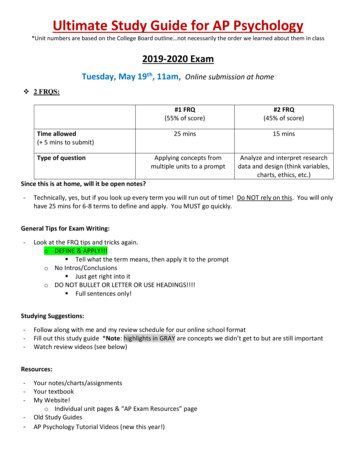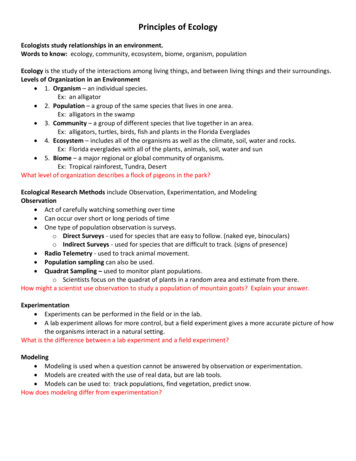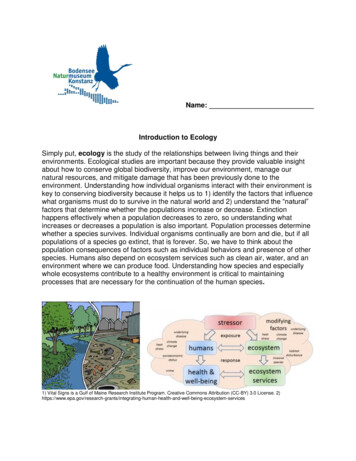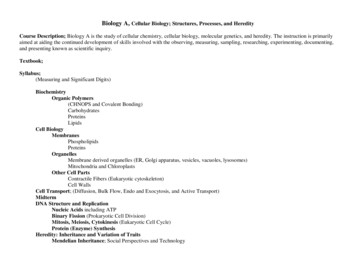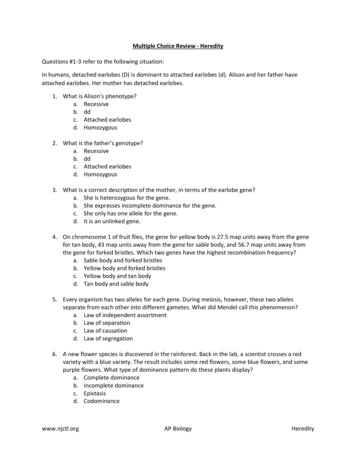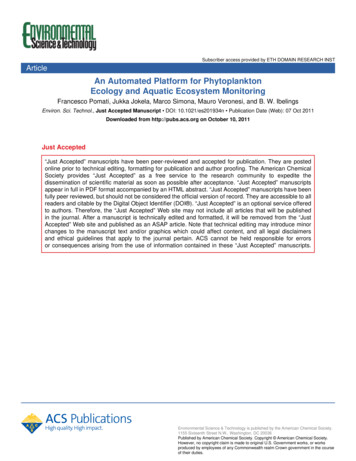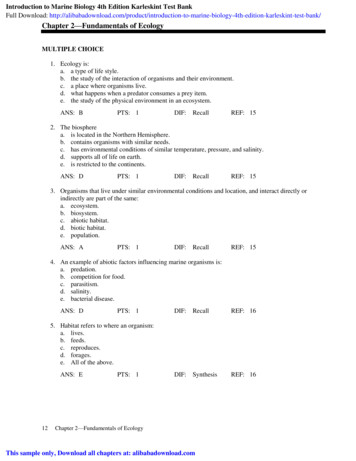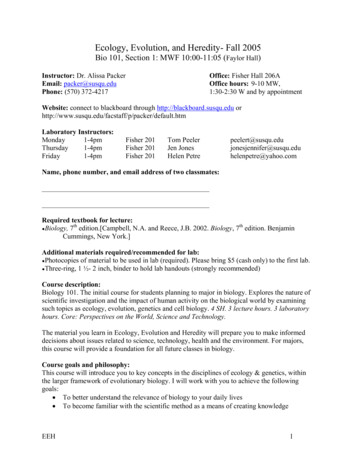
Transcription
Ecology, Evolution, and Heredity- Fall 2005Bio 101, Section 1: MWF 10:00-11:05 (Faylor Hall)Instructor: Dr. Alissa PackerEmail: packer@susqu.eduPhone: (570) 372-4217Office: Fisher Hall 206AOffice hours: 9-10 MW,1:30-2:30 W and by appointmentWebsite: connect to blackboard through http://blackboard.susqu.edu tmLaboratory her 201Fisher 201Fisher 201Tom PeelerJen JonesHelen petre@yahoo.comName, phone number, and email address of two classmates:Required textbook for lecture:thth Biology, 7 edition.[Campbell, N.A. and Reece, J.B. 2002. Biology, 7 edition. BenjaminCummings, New York.]Additional materials required/recommended for lab: Photocopies of material to be used in lab (required). Please bring 5 (cash only) to the first lab. Three-ring, 1 ½- 2 inch, binder to hold lab handouts (strongly recommended)Course description:Biology 101. The initial course for students planning to major in biology. Explores the nature ofscientific investigation and the impact of human activity on the biological world by examiningsuch topics as ecology, evolution, genetics and cell biology. 4 SH. 3 lecture hours. 3 laboratoryhours. Core: Perspectives on the World, Science and Technology.The material you learn in Ecology, Evolution and Heredity will prepare you to make informeddecisions about issues related to science, technology, health and the environment. For majors,this course will provide a foundation for all future classes in biology.Course goals and philosophy:This course will introduce you to key concepts in the disciplines of ecology & genetics, withinthe larger framework of evolutionary biology. I will work with you to achieve the followinggoals: To better understand the relevance of biology to your daily lives To become familiar with the scientific method as a means of creating knowledgeEEH1
To gain experience practicing the scientific method by designing experiments, collectingdata, and interpreting the resultsTo develop important professional skills, including oral presentations, written scientificpapers, and peer review of research proposalsWe will maximize the number of people who achieve these goals by working together to create asupportive learning environment. Asking questions is a key element of learning. I have askedyou to write down the names of two classmates for a few reasons. First, you will be more likelyto ask questions, both of me and of one another, if you know and feel comfortable with yourpeers. Second, we will function as a community of learners in this classroom. We all havesomething to contribute to the experience. Remember that you will learn as much, if not more,from each other as you will from me. Lastly, because I cannot be available to answer yourquestions 24 hours a day (particularly at midnight the night before the exam), it is important thatyou use each other as a resource for information and clarification. It is your responsibility tohave your questions answered.Finally, I want to emphasize that you are ultimately responsible for the quality of youreducational experience. Please keep this in mind over the course of the semester. I will introduceyou some of fundamental concepts in the field, along with a clear rationale for why they areimportant. However, it is your responsibility to learn the material. I expect that you will all takean active role in the learning process.Course structure:Ecology, Evolution, and Heredity consists of both a lecture and laboratory component. Thelecture component will be worth 60% of your grade and the lab component will be worth 40% ofyour grade. Because lectures will primarily emphasize concepts from the textbook, you shouldread all assignments before attending class so that you are familiar with the material. You willbe expected to participate in class discussions and to collaborate in small groups during thelecture and laboratory periods.Grading:LectureExam #1Exam #2Final examQuizzes/other assignmentsTotal points-EEHLaboratory100100100100400Termite paper (I)Biodiversity questions (G)Biodiversity proposal (G)Biodiversity presentation (G)Biodiversity paper (I)Tree identification (G)Plant/herbivore proposal (G)Plant/herb. presentation (G)Plant/herb. report (I)Foraging proposal (G)Foraging presentation (G)Foraging questions (G)Isopod proposal (G)Peer evaluation (I)Isopod poster (G)Total points-2520102510010102510010251510251005102
Attendance:Reading the textbook CANNOT substitute for attending class. Class attendance is a crucialaspect of your educational experience. To emphasize the importance I place on attendance and toensure that you also come to value the importance of attendance, I will be assessing attendancevia unannounced lecture quizzes. No make-up quizzes will be given. Quizzes will beadministered at either the beginning or end of lecture periods. Therefore it is important that youarrive to class on time and stay for its entirety. Those arriving to class late will not be given extratime to complete their quiz.More on quizzes:At least half of the lectures will begin or end with a five minute quiz. You will receive credit forcompleting the quiz, regardless of whether you have the correct answer. If you do not answerevery question or fail to turn in a quiz you will receive ZERO points. Quiz questions will be thebasis for exam questions and the answers will be discussed at the beginning of the followinglecture.What is the point of giving quizzes that are not graded for content? The quizzes force you to consider the information just presented and put it into your ownwords. This will help you to internalize the information before leaving class. The quizzes stress the most important things covered during a particular lecture therebyproviding an organizational framework for your notes. By reading your responses, I can quickly assess your understanding of the material andrecognize where you are having difficulty. This allows me to clarify any confusing pointsduring the next class rather than on the exam.Make-up examinations:Students who expect to miss any classes or exams must notify me one week prior to the class tobe missed. Make-up lecture exams will be given only for legitimate reasons as outlined byuniversity regulations. Excused absences must be accompanied with written confirmation from adoctor or the Dean of Students. Anyone who fails to comply with these procedures will receive azero for missed exams.Missing Laboratories:Missing one lab is equivalent to missing three lecture sessions. Each UNEXCUSED laboratorywill constitute a 20% reduction in your overall lab grade. In addition, laboratory assignments willnot be accepted for material covered during an unexcused absence. Therefore, you will receive aZERO for any assignments that relate to a specific missed lab. If you require missing alaboratory for LEGITIMATE reasons, please let your laboratory instructor know as soon aspossible so that other arrangements can be made.Late assignments:All assignments will be collected at the beginning of class on the due date (unless otherwisenoted on the syllabus). Late assignments will be downgraded by 10% for each day late unlessprior arrangements have been made.EEH3
Special considerations:If you require special assistance or consideration to accommodate a condition that may affectyour performance in this course, please inform me of your need at the beginning of the semesteror at the time you become aware of your need for assistance. From that point forward, anyreasonable and necessary accommodations will be implemented.Policy on Academic DishonestyI consider academic dishonesty to be a very serious offense. A general description of theuniversity policy on academic dishonesty can be found in the Student Handbook or atwww.susqu.edu/campus center/handbook/academic honesty.pdf. I adhere to the Universitypolicy and therefore you should be familiar with it. Read the definition of plagiarism carefullyand make sure that you fully understand its meaning. (Note: It would be fair game for me to givea quiz on this information.) Sharing your work with others is just as serious an offense ascopying work from others. Every instance of academic dishonesty will be dealt with andreported as outlined in the handbook. When in doubt as to whether something is consideredplagiarism, please come discuss your concerns with me before handing in your work. Note that Ireserve the right to have all written assignments submitted in an electronic format so that I cancheck assignments for plagiarism against internet sources.***Below is a tentative schedule that is subject to change as the semester progresses. Attendingevery lecture is the best way to stay informed of changes to the syllabus. You are responsible forfinding out about any information that you may have missed due to an absence.***Items due at the start of lab are indicated in BOLD. Other items will be completed in class andturned in that day.DateLecture/Discussion topicTextbook Reading(addition readings assignedin class)8/29 MOverview of syllabusScience in your daily lives8/31 WThe process of scienceChapter 19/2 FMore on the scientific processChapter 19/5 MEvolution as the unifyingtheme in biologyChapter 1EEHLab topic and assignment forweek (I individual, G group;bolded items due at start ofclass)Exploring termite behaviorBiodiv. lab I: Intro to expt. tools(Due: Termite paper- I &Biodiv. handout-G)4
9/7 WEvolution as the unifyingtheme in biology & Levels ofbiological organizationChapter 19/9 FMeiosis and sexual life cyclesChapter 139/12 MMeiosis and sexual life cyclesChapter 139/14 WMendel and the gene ideaChapter 149/16 FMendel and the gene ideaChapter 149/19 MChromosomal basis ofinheritanceChapter 159/21 WChromosomal basis ofinheritanceChapter 159/23 FMolecular basis of inheritanceChapter 169/26 MFrom gene to proteinChapter 17 pp. 309-3149/28 WOrganization and control ofeukaryotic genomesChapter 19 pp. 359-3699/30 FDNA technology and genomics Ch. 20 pp. 384-38810/3 MEXAM 110/5 WDescent with modification: ADarwinian view of lifeChapter 2210/7 FDescent with modification: ADarwinian view of lifeChapter 22Chapter 2310/12 W Evolution of populationsChapter 2310/14 FChapter 24EEHBiodiv. lab III: Data collectionBiodiv. lab IV: Collecting/analyzing dataPlant/herbivore lab I: Plant ID(Due: Biodiv. presentations-G& Plant ID handout-G)10/10 M Evolution of populationsThe origin of speciesBiodiv. lab II: Expt. design(Due: Biodiversity proposals-G)Plant/herbivore lab II: Expt.design (Due: Biodiv. reports-I& Plant proposal-G)5
10/17 M Fall Break10/19 W The origin of speciesChapter 2410/21 FChapter 25Phylogeny and systematics10/24 M Early Earth and origin of lifeChapter 2610/26 W Prokaryotic diversity &Eukaryotic originChapter 27Chapter 28 pp. 549-55110/28 FChapter 29Plant diversity I: Plantscolonized landPlant/herbivore lab III: DatacollectionForaging strategies lab I: Intro(Due: Plant/herbivorepresentations-G & Foragingproposal-G)10/31 M Plant diversity II: Evolution ofseed plantsChapter 3011/2 WIntroduction to animalevolutionChapter 32Foraging strategies lab II: Datacollection (Due: Plant/herbivorereports-I)11/4 FEXAM II11/7 MBasics of respiration andphotosynthesis11/9 WIntroduction to ecology and the Chapter 50biosphere(Due: Foraging presentation-G& Foraging questions-G)11/11 FBehavioral biologyChapter 5111/14 M Population ecologyChapter 5211/16 W Population ecologyChapter 5211/18 FChapter 52Population ecology11/21 M Community ecologyIsopod lab I: Intro (Due: Isopodproposals-G)Chapter 5311/23 W Thanksgiving Break11/25 FEEHThanksgiving Break6
11/28 M Community ecologyChapter 5311/30 W Community ecologyChapter 5312/2 FEcosystemsChapter 5412/5 MEcosystemsChapter 5412/7 WConservation biologyChapter 55 pp. 1209-121412/9 FTying it all together Isopod lab II: Data collectionIsopod poster symposium (Due:Isopod poster-G & Peerevaluations-I)FINAL EXAMEEH7
Lab topic and assignment for week (I individual, G group; bolded items due at start of class) 8/29 M Overview of syllabus Science in your daily lives Exploring termite behavior 8/31 W The process of science Chapter 1 9/2 F More on the scientific process Chapter 1 9/5 M Evolution as the unifying theme in biology
